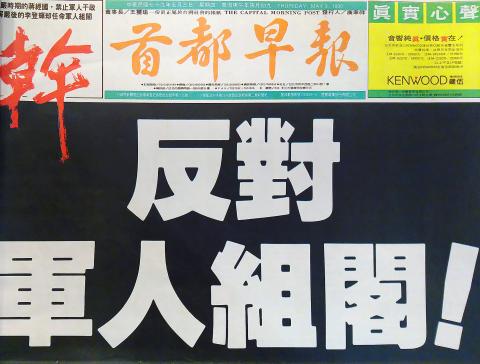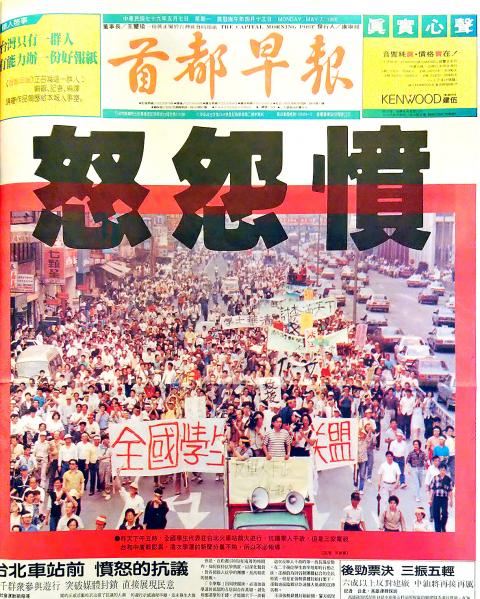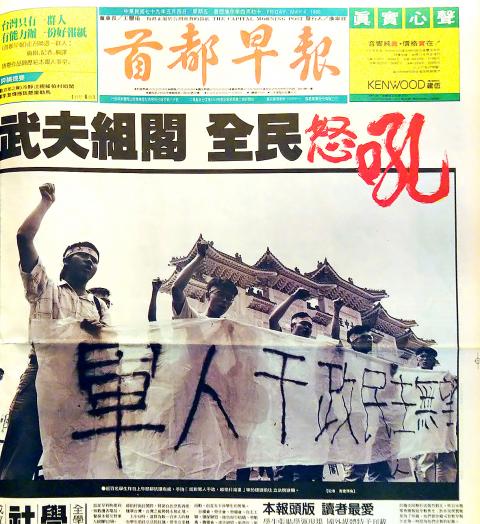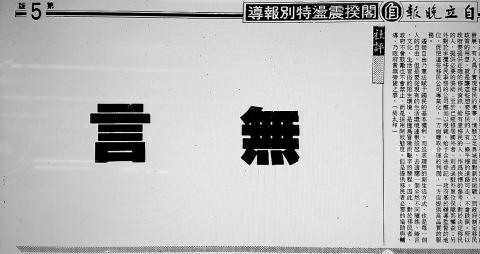April 30 to May 6
With “Fuck, we oppose a military man forming the cabinet!” plastered over its front page in angry bold print, the Capital Morning Post (首都早報) secured its place in Taiwanese media history despite only lasting for 15 months.
Hitting the stands on May 3, 1990, that day’s edition spent six full pages slamming newly inaugurated President Lee Teng-hui’s (李登輝) nomination of four-star general and then-minister of national defense Hau Pei-tsun (郝柏村) for his new administration’s premier.

Photo courtesy of National Central Library
Above the bright red curse word, the paper printed “During the Martial Law era, [former president] Chiang Ching-kuo (蔣經國) forbade the military from intervening in politics. After the Martial Law era, Lee Teng-hui appoints a military man to form his cabinet.”
While most major papers reported the story in a neutral or positive tone, two newspapers expressed their opposition to Lee’s decision. The Independence Evening Post (自立晚報) printed in large characters on its front page: “We feel great heartache and headache toward President Lee Teng-hui’s decision to nominate Hau Pei-tsun as premier,” alongside an article with the headline, “White Terror will enshroud Taiwan again.”
That day’s editorial in the paper consisted only of two large characters: wuyan (無言, or “speechless”).

Photo courtesy of National Central Library
Over the rest of the month, the Capital Morning Post continued to use strong language (but no more curse words) to bash the decision and prominently featured the resulting student protests and later violent clashes leading up to Hau’s formal appointment on June 1.
DARE TO SPEAK
The fury shown in both papers is not surprising — they were both founded by former dangwai (黨外, “outside the party”) politicians who opposed the ruling Chinese Nationalist Party (KMT) during its authoritarian era.

Photo courtesy of National Central Library
In May 1989, just over a year removed from the lifting of the newspaper ban, legislator Kang Ning-hsiang (康寧祥) took a break from politics to give the newly-liberated media industry a try.
With the headline “A newspaper that truly belongs to Taiwanese society is born today,” The Capital Morning Post debuted on May 4 with National Taiwan University history professor Cheng Chin-jen (鄭欽仁) as managing editor and Rong Fu-tian (戎撫天), a veteran newsman poached from the United Daily News (聯合報), as editor in chief.
Many staff members went on to have successful careers in the media industry or politics. Rong, for example, is the managing editor of Want Daily; deputy editor in chief Yang Hsien-hung (楊憲宏) is a well-known political commentator; and reporter Chen Sheng-shan (陳盛山) serves as director of the Taichung City Tourism Bureau. US correspondent Michael Fonte is the current liaison of the Democratic Progressive Party’s (DPP) Mission in Washington.

Photo courtesy of National Central Library
This would be Kang’s only foray into the media world as he quickly returned to politics. His many positions included National Assembly and Control Yuan member as well as deputy minister of national defense.
Former reporter Tseng Ming-tsai (曾明財) fondly recalls his time at the Capital Morning Post as the most memorable of his career.
In an article written for a blog commemorating the 20th anniversary of the lifting of the newspaper ban, Tseng writes, “It was the most glorious, most romantic, most meaningful year for an idealistic young man.”
Tseng was feeling complacent at his former job at the Taiwan Times when he heard that Kang was recruiting for a new publication that would “dare to speak up.” He had planned to refuse the offer if they approached him, but their pitch was so strong that he surrendered within minutes.
Tseng recalls the “battles” he fought as he and a group of younger reporters from green-leaning papers such as the Liberty Times (sister paper of the Taipei Times) struggled to “counter the KMT’s influence.” One of the fights took place during the 1989 election for what was then the position of Taichung County Commissioner, while the major papers supported the KMT candidate, Liao Liou-yi (廖了以). Tseng says he uncovered scandal after scandal in his paper in a bid to discredit Liao, and even though Liao still won, he said it was a thrilling experience.
Regarding the (in)famous front page, Tseng writes, “All the reporters were very proud of it.”
ABRUPT COLLAPSE
On Aug. 28, 1991, the Capital Daily News announced on its front page that it was temporarily suspending operations. It turned out to be permanent.
“The stock market is bad, the economy is stagnant and oil prices are rising because of the turmoil in the Middle East,” the statement read. “We have unexpectedly been severely impacted by the lack of interest in investors.”
Tseng had left the paper a month before, after his role was diminished due to financial difficulties.
Kang explains that after a rough first year, he was planning on raising an additional NT$200 million to expand the paper’s customer base and pay off its loans. The money never came.
“Ever since the ban was lifted, it’s been hard for new papers to survive,” he writes. “The market is still controlled by the mainstream publications. Although we have freedom to publish now, it’s still hard to maintain an independent voice. That is what we need to keep working toward.”
Lin Lih-yun (林麗雲) writes in an article for Mass Communication Research (新聞學研究) that most of the successful post-ban papers were either new publications by existing businesses or ones that had corporate financial backing. Many of the smaller papers like Capital Morning Post folded within two years.
“Many governmental departments and their chiefs must be sighing a breath of relief with the folding of Capital Morning Post,” a final statement read. “Now they can sleep in peace. But let’s hope that in the future, a group of idealistic young people may gather again to create more Taiwanese media history. But can society tolerate a newspaper like this?”
Taiwan in Time, a column about Taiwan’s history that is published every Sunday, spotlights important or interesting events around the nation that have anniversaries this week.

As Taiwan’s second most populous city, Taichung looms large in the electoral map. Taiwanese political commentators describe it — along with neighboring Changhua County — as Taiwan’s “swing states” (搖擺州), which is a curious direct borrowing from American election terminology. In the early post-Martial Law era, Taichung was referred to as a “desert of democracy” because while the Democratic Progressive Party (DPP) was winning elections in the north and south, Taichung remained staunchly loyal to the Chinese Nationalist Party (KMT). That changed over time, but in both Changhua and Taichung, the DPP still suffers from a “one-term curse,” with the

William Liu (劉家君) moved to Kaohsiung from Nantou to live with his boyfriend Reg Hong (洪嘉佑). “In Nantou, people do not support gay rights at all and never even talk about it. Living here made me optimistic and made me realize how much I can express myself,” Liu tells the Taipei Times. Hong and his friend Cony Hsieh (謝昀希) are both active in several LGBT groups and organizations in Kaohsiung. They were among the people behind the city’s 16th Pride event in November last year, which gathered over 35,000 people. Along with others, they clearly see Kaohsiung as the nexus of LGBT rights.

Jan. 26 to Feb. 1 Nearly 90 years after it was last recorded, the Basay language was taught in a classroom for the first time in September last year. Over the following three months, students learned its sounds along with the customs and folktales of the Ketagalan people, who once spoke it across northern Taiwan. Although each Ketagalan settlement had its own language, Basay functioned as a common trade language. By the late 19th century, it had largely fallen out of daily use as speakers shifted to Hoklo (commonly known as Taiwanese), surviving only in fragments remembered by the elderly. In

Dissident artist Ai Weiwei’s (艾未未) famous return to the People’s Republic of China (PRC) has been overshadowed by the astonishing news of the latest arrests of senior military figures for “corruption,” but it is an interesting piece of news in its own right, though more for what Ai does not understand than for what he does. Ai simply lacks the reflective understanding that the loneliness and isolation he imagines are “European” are simply the joys of life as an expat. That goes both ways: “I love Taiwan!” say many still wet-behind-the-ears expats here, not realizing what they love is being an